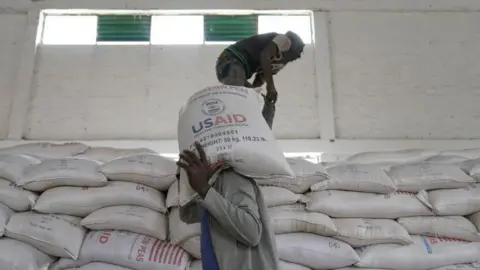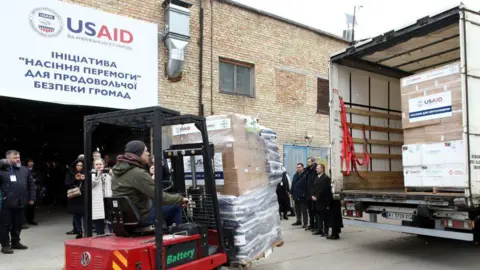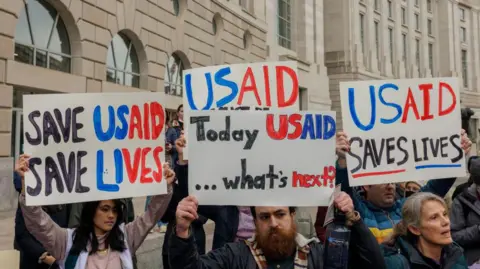'We're pawns in a game': US aid workers left in limbo overseas as agency slashed
 Getty Images
Getty ImagesOn Thursday, one USAID staffer in Central America decided it was time to pack up her desk.
Nobody told her to. In fact, nobody really had been telling her anything concrete for a few days. But the Friday deadline that would force her and colleagues around the world on to administrative leave was looming.
"We are on the Titanic right now, and we're currently sinking," the staff member said. She wanted to mourn her mission's programmes designed to bolster democracy, battle HIV, and protect the environment. But at that moment, she needed to figure out how to get her family back to the US.
She gathered up what remained of her work, leaving behind future plans, and walked out the door. "We're just pawns in this game," she said.
The Trump administration's dismantling of the US Agency for International Development has been swift, chaotic, and possibly unconstitutional, as alleged by a lawsuit filed on Thursday.
Employees around the world implementing the agency's programmes told the BBC they feel stranded by their government, and are worried how their absences will harm the countries and people they leave behind.
- Judge pauses Trump plan to put thousands of USAID staff on leave
- How a US freeze upended global aid in a matter of days
- What is USAID and why is Trump poised to 'close it down'?
The Trump administration wants to merge the agency with the US Department of State, and the president's supporters see it as an important step for cutting federal spending. The administration plans to cut the USAID workforce from about 10,000 to just a few hundred, according to the American Foreign Service Association, a union representing USAID staff, and US media reports.
On Friday afternoon, a US federal judge said he was issuing a "very limited" temporary restraining order on the shutdown plans. The order would "be directed at the placement of the 2,200 or 2,700 employees on administrative leave, and then the accelerated removal of people from their countries".
"It feels like the Hunger Games, or Squid Game," said one USAID worker stationed in South Asia who has watched colleagues and supervisors in Washington disappear one by one from messaging systems.
The deadline was Friday night for all remaining staff to go on leave. The USAID website said a still-unspecified plan was underway to bring employees back to the US within 30 days, though it said some could apply for exceptions and there was no "specific deadline" to come back.
Workers who spoke to the BBC on condition of anonymity because they feared retaliation said they were confused. Updates from superiors in Washington only bring more questions: How would they get home? Who would move their belongings? And where would they live once they were back in the US?
But their greatest questions probably won't be answered for years. What will happen to countries without USAID programmes fighting disease, famine and conflict? What becomes of projects that help developing countries adapt to climate change, transition to democracy, or end gender-based violence?
"It's terrifying for a lot of people who have lived and worked overseas for a long time," said one USAID staffer, recently transferred to the Latin American region. "Being uprooted without a lot of understanding of what it means."
 Getty Images
Getty ImagesThe staffer worried that the drastic changes ahead for USAID's Office of Asia, Latin America, and the Caribbean (ALAC) would leave the US "severely weakened" to respond to the region's volcanic eruptions, government unrest and hurricanes.
They also feared for US citizens, diplomatic staff and other personnel. While still able to access USAID systems, many can no longer use emergency alerts and panic buttons meant to keep them safe.
A former US military servicemember, whose partner works for USAID abroad, feared the withdrawal would weaken America's abilities in conflict zones.
USAID staff can go places where the military can't, like refugee camps, the former servicemember said, because they provide assistance and evoke less suspicion.
The sudden withdrawal could leave those relying on USAID, with "a sense of abandonment, a sense of betrayal, a sense of deceit", he said.
A campaign against government spending
Donald Trump campaigned on curtailing government waste and foreign aid to countries like Ukraine. Once in office, he gave billionaire entrepreneur Elon Musk free rein to identify drastic government cuts as the head of a new task force called the Department of Government Efficiency (Doge.)
Trump, Musk and their allies have used USAID as a symbol of wasteful government spending, with Musk calling it "evil" and a "criminal organisation" on X.
A portion of Americans might be open to the cuts: about six in 10 US adults believed the US government spent too much on foreign aid, a March 2023 poll from the Associated Press and NORC suggested.
The US is the world's biggest provider of humanitarian aid, but that still represents just a fraction of total federal spending.
On a tour of Central America this week, Secretary of State Marco Rubio – also now acting head of USAID – urged patience and defended the changes at a staff meeting in Guatemala.
"I know it's hard to ask for patience," he told USAID Head of Mission Haven Cruz-Hubbard, the New York Times reported. "I know it's hard to ask for trust, because you've never met me before."
But his harsher comments towards USAID came on Fox News, when he accused the agency of "rank insubordination".
USAID staffers told BBC the comments did not instil confidence. "We work around the clock to answer all the tasks, questions from DC, so I really don't honestly know what he means," a USAID employee in Central America said.
The White House and state department have highlighted foreign aid they believe does not align with the administration's goals.
"I think what is important is the United States has to get its financial house in order for us to be able to do good anywhere in the future, and we're in the process of doing so," Republican congressman Mike Turner told the BBC on Thursday.
Republican Senator Jim Risch, chair of the Senate Foreign Relations Committee, said he supported Trump, noting that "the idea of merging USAID and the state department has been floated by nearly every administration" since 1998.
USAID programming can sometimes be "highly inefficient", acknowledged a recently laid-off employee at a nonprofit that relied on USAID funding. She and other colleagues were let go when that funding stopped.
Asking to remain anonymous given her precarious employment situation, she said programmes can be redundant, and she had seen nongovernmental organisations make mistakes with paperwork or operations abroad. But efficiency is not behind USAID's demise, she said.
"A lot of this is a distraction to create chaos," the nonprofit worker said. "To distract us from what exactly? I think it's dismantling the federal government and amassing power."
 Getty Images
Getty ImagesUSAID's shutdown, and Trump's 90-day pause on all foreign assistance, also dealt blows to nonprofits and other organisations reliant on federal grants.
"A whole sector has been destroyed," the nonprofit worker said.
As Washington debates their fate, USAID workers are focused on getting back to the US and rebuilding their lives.
The Latin America regional staff member, who identifies as transgender and nonbinary, was set to fly to Washington in the coming days to comply with the recall.
They said they now feel under siege on two fronts, both as a transgender person - after an executive order was signed recognising two official sexes in the US - and as a USAID worker.
"People have dedicated their lives for several decades to this work abroad representing US interests, the US government, supporting missions," the employee said. "And the treatment is pretty horrendous."
